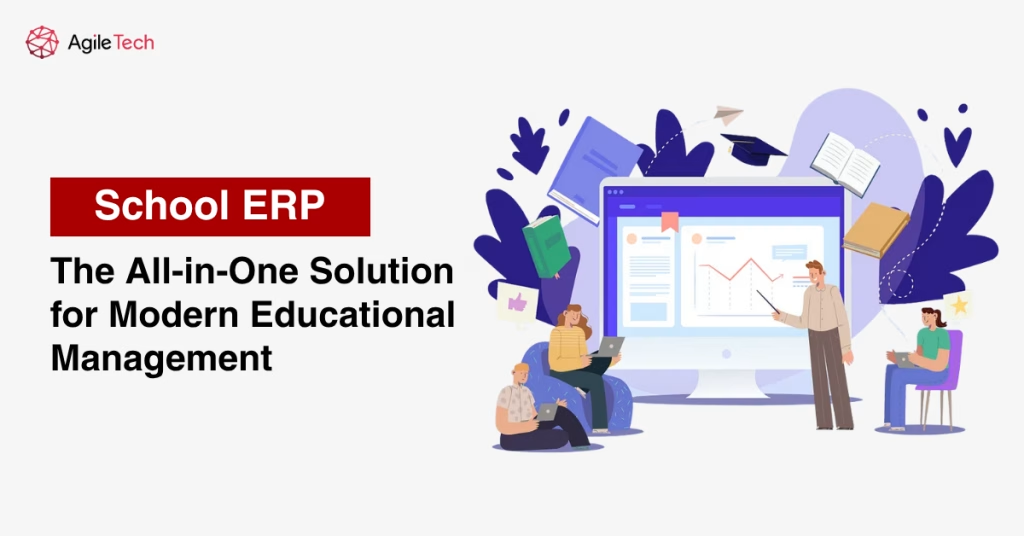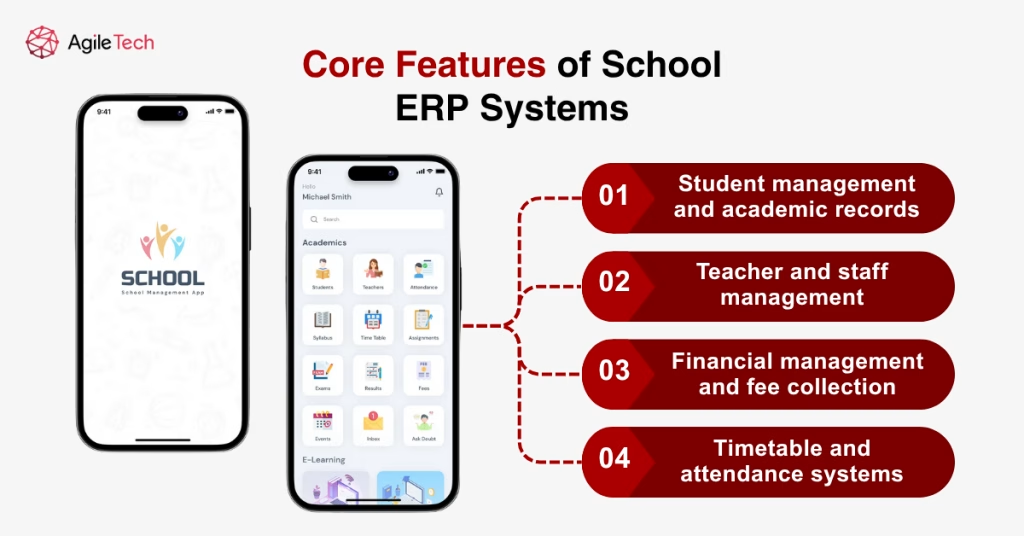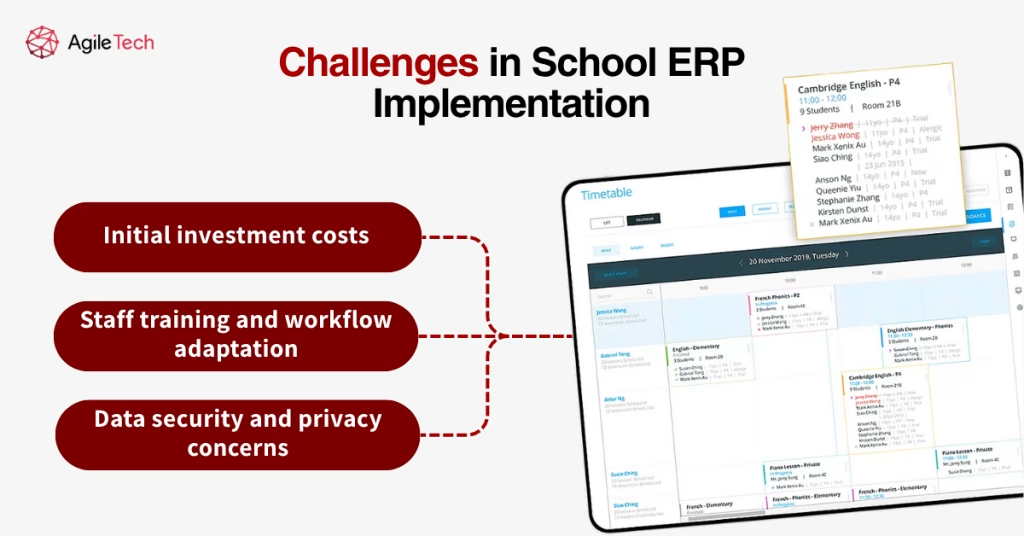School ERP: The All-in-One Solution for Modern Educational Management
In today’s rapidly evolving educational landscape, schools and educational institutions face increasing pressure to manage complex operations while maintaining high standards of education. From student enrollment and academic tracking to financial management and parent communication, the administrative burden on educational institutions has never been greater. This is where school ERP (Enterprise Resource Planning) systems emerge as game-changing solutions, revolutionizing how educational institutions operate and thrive in the digital age. Modern school ERP software has become essential for institutions seeking comprehensive education ERP solutions that streamline operations and enhance educational outcomes.

- 1. What is School ERP and why is it Important?
- 2. Core Features of School ERP Systems
- 3. Benefits of Implementing School ERP
- 4. Challenges in School ERP Implementation
- 5. Who Should Use a School ERP System?
- 6. Future Trends in School ERP Development
- 7. Why Choose AgileTech as Your School ERP Developers?
- Conclusion
1. What is School ERP and why is it Important?
1.1. Definition and Basic Concepts
School ERP (Enterprise Resource Planning) is a comprehensive software solution designed specifically for educational institutions to integrate and manage all their administrative, academic, and financial processes in one centralized platform. Unlike generic business ERP systems, education ERP is tailored to address the unique needs of educational environments, encompassing everything from student admissions and grade management to staff scheduling and parent communication.
At its core, a school ERP system serves as the digital backbone of an educational institution, connecting various departments and functions through a unified database. This integration ensures that information flows seamlessly across different areas of school operations, eliminating data silos and creating a cohesive management ecosystem. ERP for schools has become increasingly sophisticated, offering specialized modules that address the complex requirements of modern educational institutions.
The importance of school ERP software in modern education cannot be overstated. As educational institutions grow in size and complexity, manual processes become increasingly inefficient and error-prone. School ERP systems provide the technological infrastructure necessary to handle large volumes of data, automate routine tasks, and provide real-time insights into institutional performance.
1.2. Differences Between School ERP and Traditional Management Software
Traditional school management software typically focuses on individual functions such as student information systems or library management. These standalone solutions often operate in isolation, requiring manual data entry across multiple platforms and creating opportunities for inconsistencies and errors.
School ERP software, however, offers a holistic approach to institutional management. They integrate multiple functionalities into a single platform, ensuring data consistency and providing comprehensive insights into school operations. While traditional software might handle student records separately from financial data, an education ERP system maintains these interconnected relationships, allowing administrators to understand how different aspects of school operations influence each other.
The scalability of ERP for schools also sets them apart from traditional solutions. As institutions grow, school ERP systems can accommodate increased data volumes, additional users, and expanded functionality without requiring complete system overhauls. This adaptability makes school ERP software a long-term investment in institutional efficiency and growth.
2. Core Features of School ERP Systems

2.1. Student Management and Academic Records
The student management module forms the heart of any school ERP system, providing comprehensive tools for managing student information throughout their educational journey. This includes detailed student profiles containing personal information, academic history, attendance records, disciplinary actions, and extracurricular activities.
Academic record management capabilities allow schools to track student progress across multiple subjects, terms, and academic years. The education ERP system can generate detailed transcripts, calculate GPAs, and provide insights into student performance trends. Advanced features include automated grade calculations, customizable report cards, and integration with online learning platforms.
Modern school ERP software also supports diverse assessment methods, accommodating traditional grading systems as well as competency-based evaluations. They can handle complex academic structures, including multiple campuses, different curricula, and various certification requirements. ERP for schools ensures that all student data remains centralized and easily accessible to authorized personnel.
2.2. Teacher and Staff Management
Effective human resource management is crucial for educational institutions, and school ERP systems provide comprehensive tools for managing teaching and administrative staff. The system maintains detailed employee profiles including qualifications, certifications, employment history, and performance evaluations.
Staff scheduling features allow administrators to create and manage complex timetables, ensuring optimal resource allocation and avoiding scheduling conflicts. The education ERP can track teacher workloads, substitute arrangements, and professional development activities. Payroll integration ensures accurate compensation calculations based on hours worked, overtime, and performance incentives.
Performance management tools enable administrators to set goals, track achievements, and conduct regular evaluations. The school ERP software can also manage continuing education requirements, certification renewals, and professional development opportunities, ensuring that staff members remain current with educational standards and best practices.
2.3. Financial Management and Fee Collection
Financial management is often one of the most challenging aspects of running an educational institution, and ERP for schools provides robust tools to streamline these processes. The fee management module handles diverse fee structures, including tuition, activity fees, transportation costs, and miscellaneous charges.
Automated billing features generate invoices, track payments, and manage overdue accounts. The school ERP system can handle multiple payment methods, including online payments, bank transfers, and installment plans. Integration with accounting software ensures accurate financial reporting and compliance with regulatory requirements.
Budget management tools allow administrators to create detailed budgets, track expenses, and generate financial reports. The education ERP system can provide real-time insights into cash flow, outstanding receivables, and budget variances, enabling proactive financial management and strategic planning. School ERP software makes financial transparency and accountability much easier to maintain.
2.4. Timetable and Attendance Systems
Creating and managing timetables for large educational institutions involves complex scheduling considerations including room availability, teacher schedules, and student requirements. School ERP systems automate this process, using sophisticated algorithms to optimize schedules while respecting constraints and preferences.
The attendance management module provides multiple methods for tracking student and staff attendance, including traditional roll calls, biometric systems, and RFID cards. Real-time attendance data enables quick identification of patterns and immediate notification of absences to parents and administrators through the education ERP platform.
Advanced features include automated attendance reports, integration with disciplinary systems, and correlation with academic performance data. The school ERP software can identify attendance trends, generate early warning alerts for students at risk, and provide comprehensive attendance analytics for administrative decision-making. ERP for schools ensures that attendance tracking becomes seamless and accurate.
Read more: 20+ Superior E-learning Platforms to Choose [Updated 2025]
3. Benefits of Implementing School ERP
3.1. Streamlining Management Processes
The primary benefit of implementing a school ERP system is the significant streamlining of administrative processes. By integrating various functions into a single platform, schools can eliminate redundant data entry, reduce processing time, and minimize errors. Automated workflows ensure that routine tasks are completed consistently and efficiently, freeing up staff time for more strategic activities.
Process standardization is another key advantage, as education ERP systems enforce consistent procedures across different departments. This standardization improves data quality, ensures compliance with institutional policies, and facilitates staff training and development. The school ERP software audit trails provide transparency and accountability, essential for regulatory compliance and quality assurance.
Resource optimization becomes possible through comprehensive data analysis and reporting capabilities. Administrators can identify underutilized resources, optimize staff allocation, and make data-driven decisions about infrastructure investments. The result is improved operational efficiency and better resource utilization across the institution when using ERP for schools.
3.2. Enhancing Educational Quality
School ERP systems directly contribute to educational quality improvement through enhanced data visibility and analysis capabilities. Teachers and administrators gain access to comprehensive student performance data, enabling personalized learning approaches and targeted interventions for struggling students.
The education ERP ability to track student progress over time provides valuable insights into learning patterns and curriculum effectiveness. Educators can identify knowledge gaps, adjust teaching methods, and implement evidence-based instructional strategies. Integration with learning management systems further enhances the educational experience by providing seamless access to digital resources and online assessments.
Professional development opportunities are also enhanced through the school ERP software ability to track training needs, monitor certification requirements, and coordinate professional development activities. This ensures that educators remain current with best practices and emerging educational technologies when using comprehensive ERP for schools solutions.
3.3. Improving Communication Between Schools and Parents
Modern parents expect regular communication about their children’s educational progress, and school ERP systems provide multiple channels for effective parent engagement. Parent portals offer secure access to student information, including grades, attendance records, and upcoming assignments, through the education ERP platform.
Automated communication features send notifications about important events, schedule changes, and academic milestones. The school ERP software can customize communication based on parent preferences, using email, SMS, or mobile app notifications. This proactive communication approach helps parents stay informed and engaged in their children’s education.
The transparency provided by ERP for schools builds trust between schools and parents, as families can access real-time information about their children’s progress and school activities. This improved communication often leads to better parent involvement and enhanced student outcomes when utilizing comprehensive school ERP systems.
4. Challenges in School ERP Implementation

4.1. Initial Investment Costs
The financial investment required for school ERP implementation can be substantial, particularly for smaller institutions with limited budgets. Costs include software licensing, hardware infrastructure, customization, training, and ongoing maintenance. The initial expense often requires careful budget planning and may necessitate phased implementation approaches for education ERP systems.
However, institutions should consider the long-term return on investment when evaluating school ERP software costs. The efficiency gains, reduced manual labor, and improved decision-making capabilities often justify the initial investment over time. Many ERP for schools vendors offer flexible pricing models, including subscription-based options that can help institutions manage costs more effectively.
Cost-benefit analysis should include both direct financial impacts and indirect benefits such as improved educational outcomes, enhanced reputation, and increased operational efficiency. These factors can contribute to long-term institutional success and sustainability when implementing comprehensive school ERP systems.
4.2. Staff Training and Workflow Adaptation
Successful school ERP implementation requires significant changes to existing workflows and procedures, which can be challenging for staff members accustomed to traditional methods. Resistance to change is common, particularly among employees who have developed expertise with existing systems.
Comprehensive training programs are essential for the successful adoption of education ERP solutions, but they require time and resources that may strain institutional capacity. Different staff members may require varying levels of training based on their roles and technical proficiency. The learning curve can temporarily reduce productivity as staff members adapt to new school ERP software and processes.
Change management strategies should address these challenges through clear communication, adequate training resources, and ongoing support. Involving staff members in the selection and implementation process can help build buy-in and reduce resistance to change when adopting ERP for school solutions.
4.3. Data Security and Privacy Concerns
Educational institutions handle sensitive information, including student records, financial data, and personal information that requires robust security measures. School ERP systems must comply with various privacy regulations and security standards to protect this sensitive data.
Cybersecurity threats are constantly evolving, requiring ongoing vigilance and system updates to maintain security. Institutions must implement comprehensive security policies, conduct regular security audits, and provide security training for staff members. The consequences of data breaches can be severe, including regulatory penalties, reputation damage, and legal liability when using education ERP systems.
Cloud-based school ERP software solutions offer advantages in terms of security infrastructure and expertise, but they also introduce concerns about data control and third-party access. Institutions must carefully evaluate security measures and ensure that ERP for schools vendors meet their security and compliance requirements before implementation.
5. Who Should Use a School ERP System?
School ERP systems benefit a wide range of educational institutions, but the specific needs and circumstances of each organization determine the most appropriate implementation approach. K-12 schools, colleges, universities, and specialized training institutes all can benefit from education ERP systems, though their requirements may differ significantly.
Large institutions with complex administrative structures and multiple departments typically realize the greatest benefits from comprehensive school ERP software implementations. These organizations often have the resources and technical expertise necessary to support sophisticated systems and can justify the investment through significant efficiency gains.
Smaller institutions may benefit from cloud-based ERP for schools solutions that offer lower initial costs and reduced technical requirements. These systems can provide many of the same benefits as larger implementations while being more accessible to institutions with limited resources.
Growing institutions that are expanding their programs, student body, or facilities should consider school ERP systems as part of their growth strategy. The scalability of education ERP systems makes them valuable investments for institutions planning future expansion.
Read more: What Does Customer Training LMS Mean? How To Build a Customer Training LMS?
6. Future Trends in School ERP Development
The future of school ERP systems is being shaped by emerging technologies and evolving educational needs. Artificial intelligence and machine learning are being integrated into education ERP systems to provide predictive analytics, automated insights, and personalized recommendations for students and administrators.
Mobile technology continues to play an increasingly important role, with school ERP software offering comprehensive mobile applications for students, parents, and staff. These mobile solutions provide anywhere, anytime access to critical information and functionality.
Cloud computing is becoming the standard deployment model for ERP for schools systems, offering advantages in terms of accessibility, scalability, and cost-effectiveness. Cloud-based school ERP systems also facilitate integration with other educational technologies and services.
Integration with emerging educational technologies such as virtual reality, augmented reality, and blockchain is beginning to appear in advanced education ERP systems. These technologies offer new possibilities for educational delivery, credential verification, and student engagement through innovative school ERP software solutions.
7. Why Choose AgileTech as Your School ERP Developers?
AgileTech stands out as a leading provider of school ERP solutions with deep expertise in educational technology and a comprehensive understanding of institutional needs. Our team combines technical excellence with educational domain knowledge, ensuring that our education ERP systems address real-world challenges faced by educational institutions.
Our commitment to innovation ensures that our school ERP software solutions incorporate the latest technologies and best practices in educational management. We work closely with educational institutions to understand their unique requirements and develop customized ERP for schools solutions that align with their goals and objectives.
AgileTech’s proven track record includes successful implementations across diverse educational environments, from small private schools to large university systems. Our comprehensive support services include implementation planning, staff training, ongoing maintenance, and continuous system enhancement for school ERP systems.
We prioritize security and compliance, ensuring that our education ERP systems meet the highest standards for data protection and regulatory compliance. Our cloud-based school ERP software solutions offer robust security measures while providing the flexibility and scalability that modern educational institutions require when implementing comprehensive ERP for schools platforms.
Conclusion
School ERP systems represent a transformative approach to educational management, offering comprehensive solutions that address the complex challenges facing modern educational institutions. By integrating administrative, academic, and financial processes into unified platforms, these education ERP systems enable institutions to operate more efficiently, make better decisions, and focus on their core mission of providing excellent education.
The benefits of school ERP software implementation extend far beyond administrative efficiency, encompassing improved educational quality, enhanced parent communication, and better resource utilization. While implementation challenges exist, careful planning, adequate training, and ongoing support can ensure successful adoption and long-term success with ERP for schools solutions.
As educational institutions continue to evolve and embrace digital transformation, school ERP systems will play an increasingly important role in enabling institutional success. The investment in comprehensive education ERP solutions today positions institutions for continued growth and excellence in the future.
For educational institutions considering school ERP software implementation, partnering with experienced developers like AgileTech ensures access to cutting-edge solutions, expert guidance, and ongoing support. The journey toward digital transformation in education begins with choosing the right ERP for school system and the right implementation partner.